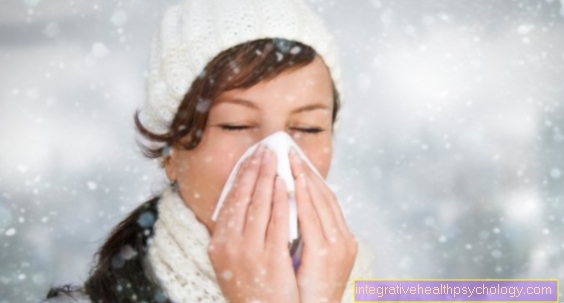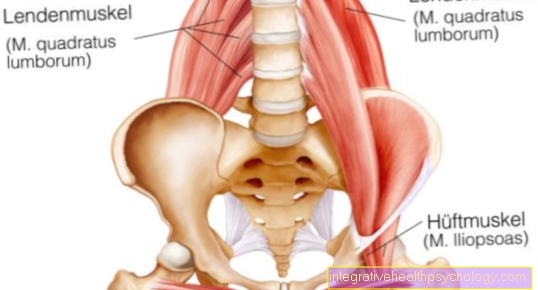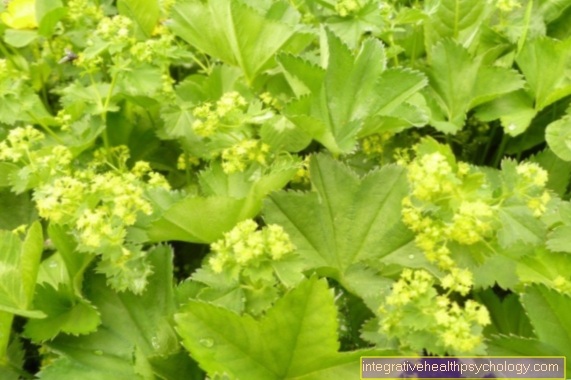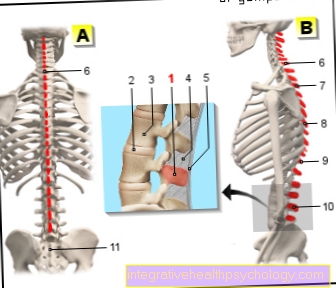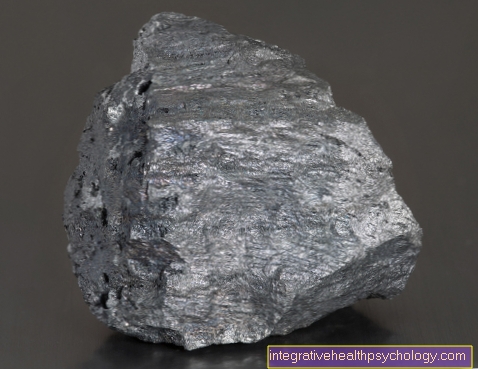Throat irritation
introduction

Coughing is an important, endogenous protective reflex of our body, but also a common symptom of many diseases of the respiratory tract and the lungs.
Before we cough, a subjectively perceived urge to cough occurs, triggered by various factors, such as Foreign matter or cold air. They stimulate individual, sensory (lat .: afferent) Nerve fibers in the area of the upper respiratory tract, which in turn are interconnected with other nerves running upwards. This is how the signal finally reaches the “cough center” in our brain. There are interconnections to other parts of the brain, on the other hand there is a switch to motor (lat .: efferent) Nerve fibers. They pull down to the diaphragm, the chest and abdominal muscles, and the vocal fold apparatus. Ultimately, their arousal and subsequent activity causes the process of coughing.
Triggers the cough
A variety of substances can trigger an urge to cough. The most common are:
- Physical stimuli (Cold air, dry air)
- Mechanical stimuli (Foreign body)
- Chemical stimuli (Citric acid, distilled water, Drugs such as ACE inhibitors)
- The body's own inflammation mediator (e.g. bradykinin)
- Bacteria, viruses and other pathogens
- Respiratory diseases
- allergy
- Gastroesophageal reflux
- Cigarette smoke
Throat irritation after eating
Coughing after eating can have many reasons. In principle, a increased mucus formation in the bronchi observe. But how can this be explained? While we are ingesting food, that is above all Parasympathetic nervous system, active as part of our autonomic nervous system (“rest and digest”). It stimulates digestion and promotes the formation of mucus and saliva, so that a coughing stimulus is triggered.
Still can frequent and intense coughing after eating, be an indication of other clinical pictures. This includes e.g. gastroesophageal reflux. In this condition, wrongly occurs Stomach acid in the esophagus (Latin: esophagus). From there, small amounts can be inhaled and thus cause the urge to cough. Other symptoms of reflux disease include heartburn, difficulties swallowing and pain behind the sternum.
therapy

Many of those affected suffer from strong urge to cough. In addition to tried and tested home remedies, the pharmacy offers numerous means of relief. But first of all, the actual cause of the urge to cough should be clarified. Because depending on the trigger, the therapy can be very different.
1) Foreign body
- The main reason for sudden urge to cough can be unintentionally inhaled foreign bodies. Typically, small insects are encountered when staying outdoors, e.g. inhaled during a bike ride and cause immediate coughing. Here it is advisable to take a few quick sips to flush the troublemaker out of the throat. Usually this simple measure is enough to quench the stimulus. But also "swallowed" food, eaten too hastily or carelessly, can trigger a brief urge to cough. Again, it is advisable to drink to calm the stimulus. In the worst case, the food, e.g. a candy sticks in the windpipe (lat .: trachea) and can lead to serious problems.
2) Cold or dry air
- Some people in particular Allergy sufferers, have very sensitive airways: the mucous membrane reacts sensitively to small changes in the air, especially to fluctuations in humidity and temperature. Those affected quickly feel an annoying, persistent urge to cough, followed by an unproductive, dry cough.
- In the cold winter months, with constant alternation between dry heating air and cold outside air, the urge to cough is often particularly persistent. General room air humidification is therefore a suitable and simple measure: e.g. damp, small towels on the heater to improve the indoor climate. There are also special room humidifiers available in stores. Regular ventilation and possibly checking the humidity with a hydrometer can also help.
- To prevent the mucous membranes from drying out and to calm the urge to cough, you can also inhale with hot steam.
3) bacteria and viruses
- In the context of e.g. Colds or one bronchitis In many cases, those affected suffer from throat irritation. The cause of this are bacteria and viruses that damage and irritate the mucous membrane. Our body uses the urge to cough and the subsequent cough as a defense mechanism to remove the pathogens from the system. In principle, coughing is quite useful, but is uncomfortable and painful in the long term. So what to do
- First of all, candies and lozenges can help. They promote the flow of saliva, have a calming effect and prevent the mucous membranes from drying out. Many people also find it pleasant to drink warm tea, possibly sweetened with honey. Special cough teas with e.g. Anise, thyme or sage.
- For many generations, the combination of onions and honey has proven to be Home remedies proven. To do this, cut a kitchen onion into small cubes and fill them in a glass or a can. Then pour in honey until the onion cubes are completely covered. Be sure to close the jar tightly and leave it to stand overnight. The release of the ingredients creates an anti-inflammatory and germicidal brew, which also soothes the irritated airways. Unfortunately, the taste or smell takes some getting used to! However, taken two to three times a day, it can provide relief in many cases.
- If common home remedies cannot quench the urge to cough, a visit to the pharmacy is recommended. A variety of over-the-counter medicines for coughing, so-called "Cough suppressants"Or so-called" cough syrup "offered. You can choose between herbal remedies, e.g. on the basis of ivy extract or synthetic active ingredients.
- In the case of a productive cough, i.e. cough with sputum, these cough suppressants should only be taken with caution and medical advice.
Read more on the topic: Cough medication
4) allergy
- With allergic Respiratory asthma (Latin: bronchial asthma), the body responds to actually harmless stimuli, such as Bee pollen or animal hair, with an excessive defense reaction: inflammation, narrowing and mucus formation are among others. the consequence.
- Under certain circumstances, mild forms of bronchial asthma can manifest themselves in an urge to cough, followed by attack-like dry, tickly cough. First and foremost, the trigger should first be identified and, if possible, eliminated. Special inhalation sprays and medication help with therapy.
Suppression of the cough stimulus
Coughing and the dry cough that follows can seriously affect everyday life. Those affected often try to simply suppress it. But is that possible?
Basically, the urge to cough can be suppressed to a certain extent. By e.g. Breathing techniques, moistening the airways or special postures can reduce the annoying feeling. Avoid completely The urge to cough can only be suppressed or suppressed with the help of strong medication.
This is one of the most effective active ingredients Codeine or dihydrocodeine. Since they belong to the group of opiates like morphine, they can only be purchased with a prescription and only on accurate medical advice to take. Because wrong application or Overdose can momentous consequences (e.g. respiratory arrest). Due to its structural similarity to heroin, it must not be used by opioid addicts under any circumstances! At productive, mucus-forming cough is codeine do not apply. By suppressing the coughing stimulus, the secretion remains in the bronchi and leads to an adhesion and spread of the bacteria, so that e.g. a lung infection (Latin: pneumonia) can arise.
To sum up, codeine, when used correctly, is a very reliable tool for suppressing coughs. However, it should only be the last resort, as dangerous side effects are possible.
Throat irritation in children

Coughing in children is extremely common and can have different causes. In most of the cases it is harmless Coldsaccompanied by e.g. Runny nose and sore throat. To be distinguished from this, however, are above all Whooping cough and croup:
1) whooping cough
- Whooping cough (lat .: Pertussis) is a highly contagious infectious disease caused by the bacterium Bordetella pertussis. It can last for several months and has three stages:
- Catarrhal stage (duration 1-2 weeks): Flu-like symptoms such as runny nose, slight cough and fever.
- Convulsive stage (duration 4-6 weeks): Numerous seizure-like, especially Coughing attacks occurring at night, followed by wheezing on inhalation. The children feel a strong urge to cough, so vomiting is not uncommon.
- Stage decrementi (duration 6-10 weeks): Slow resolution of symptoms.
- In contrast to other infectious diseases, eradicating whooping cough through vaccination is not possible from today's perspective. The aim is, therefore, as soon as possible (immediately after the 2nd month of life) and more completely Vaccination protection against whooping cough for particularly vulnerable patients, namely infants and small children. This group of patients can die from serious complications of whooping cough infection!
Read more about whooping cough
2) pseudo croup
- Typically, children between 6 months and 6 years of age develop the disease, which is usually caused by viruses. The larynx becomes inflamed (lat .: laryngitis), accompanied by a swelling of the mucous membrane of the windpipe below the vocal cords. A very characteristic, "barking" cough is triggered, accompanied by wheezing and breathing sounds Shortness of breath.
- In many cases, affected children panic, sometimes making their situation worse. It is therefore extremely important that in such cases parents have a calming effect on their child and first ensure fresh air in the children's room. A doctor should then be consulted in order to ensure supportive drug therapy (e.g. cortisone).
- Ultimately, however, this disease appears far more dramatic than it actually is. In the vast majority of cases, the young patients do not need any assistance with breathing (intubation) and recover relatively quickly.


